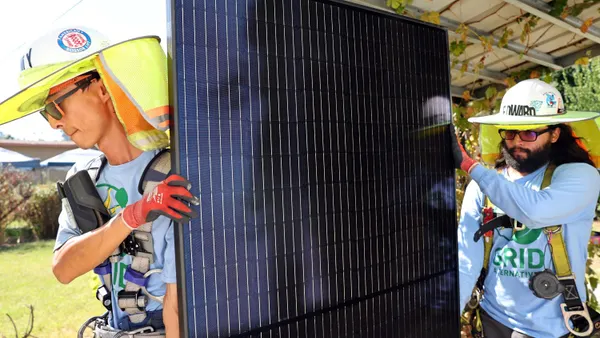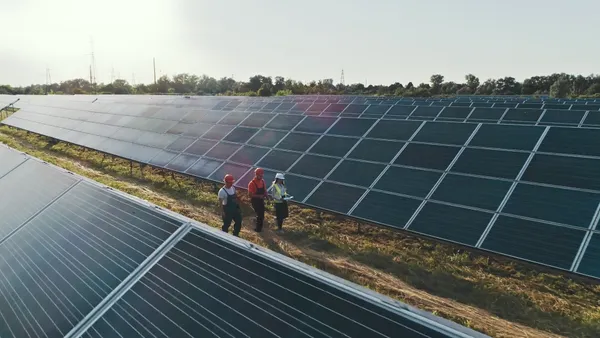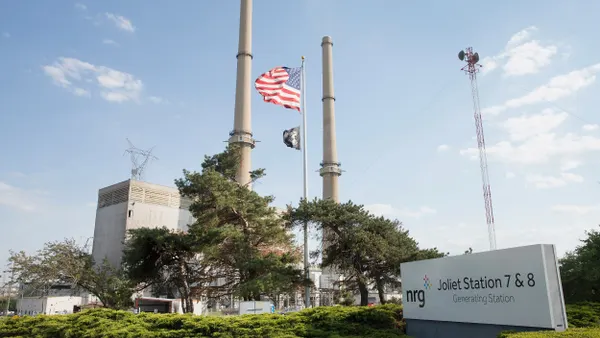Dive Brief:
-
Some participants felt the aftershocks from last week's last-minute negotiations that allowed the Vogtle nuclear reactor construction in Georgia to move forward as Standard & Poor's Financial Services (S&P) downgraded several utilities with stakes in the troubled project.
-
S&P downgraded Florida municipal utility JEA, the Municipal Electric Authority of Georgia (MEAG), Oglethorpe Power, Dalton Utilities and electric cooperative PowerSouth, citing the possibility of further cost increases.
- S&P did not change its rating on Southern Company's subsidiary, Georgia Power, which ended up in control of the project's fate at the conclusion of the negotiations, but S&P removed its negative credit watch warning on the utility.
Dive Insight:
In last minute negotiations last week, the owners of the Vogtle nuclear project accepted the latest $2.1 billion cost increase, but with conditions.
If the cost estimate of the project goes $800 million above the current cost estimate, Georgia Power has agreed to shoulder 10% of each partner's share. If costs rise beyond $1.6 billion to $2.1 billion from current estimates, Georgia Power would take on 20% of the co-owner's shares. If the costs rise above $2.1 billion, Georgia Power would be liable for that increase but could also cancel the project. As part of the agreement, the co-owners, except for Georgia Power, gave up their rights to exit the project because of rising costs.
In 2008, estimates put the cost of the Vogtle project at $10.4 billion. By 2017, the estimate had ballooned to $15.7 billion. The latest revision suggests the cost is now about $18 billion, which S&P estimates to be $27 billion to $28 billion including financing costs.
Abandonment of the right to cancel their participation in the nuclear project could leave the municipal and cooperative co-owners with stranded investments if Georgia Power cancels the project, leading S&P to lower the ratings of those utilities.
"We do not consider this budget revision final. Consequently, we believe that the ultimate cost to MEAG is uncertain," S&P analysts Jeffrey Panger and David Bodek wrote. "We believe significant risks remain that will continue to challenge the Vogtle project, and additional overruns or project delays are possible."
Georgia Power increased its potential liability to future cost increases by agreeing to shoulder higher portions of the costs, but removed the threat that the other owners could scuttle the project.
For S&P, that was enough to remove Southern Co. and most of its subsidiaries, including Georgia Power, from their credit watch negative outlook, though Southern's Gulf Power remained negative.
"We expect broad-based political and regulatory support for the nuclear construction project to persist," S&P Global Ratings analysts Obioma Ugboaja and Safina Ali wrote. That support includes comments from the Department of Energy indicating that an additional $3.7 billion in federal loan guarantees will be made available for Vogtle. In addition, because Georgia Power is not seeking regulatory recovery for its share of the most recent $2.3 billion cost increase, a potential increase in regulatory risk from the Georgia Public Service Commission "is not as imminent, but remains a longer term concern," they wrote.
Those factors suggest the possibility that Southern's effective management of regulatory risk could remain intact, assuming additional cost overruns are manageable, with no lapse in the nuclear projects in-service date schedules, Ugboaja and Ali wrote.
Georgia Power escaped the recent downgrades because of their ownership structure as an investor owned utility. The municipal utilities and electric cooperatives only have one group of people to pay for cost overruns, their member-ratepayers. "That is why you saw the negotiations you did" between Georgia Power and the other entities, Jeffrey Panger at S&P, told Utility Dive. "They didn't have an equity layer to spread the hurt to."
JEA and PowerSouth were caught up in the downgrades because they have power purchase agreements with MEAG. Both entities agreed to take a 20 year portion of MEAG's purchase obligation. That obligation exposes JEA and PowerSouth to MEAG's liability to future Vogtle cost overruns or the possibility that the project does not come online. Taking a "weak link approach" Panger said JEA and PowerSouth's ratings were lowered to reflect MEAG's risk in Vogtle, as the muni has a 22.7% share in the project.
Georgia Power owns 45.7% of the Vogtle project. Oglethorpe Power owns 30%, and Dalton has a 1.6% interest.
At publishing time, rating firms Moody's Investors Service and Fitch Ratings had not taken action on the Vogtle owners' credit ratings.












